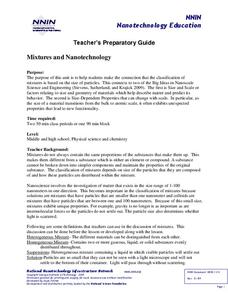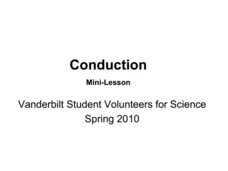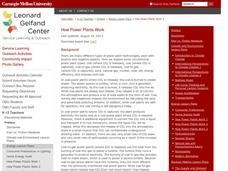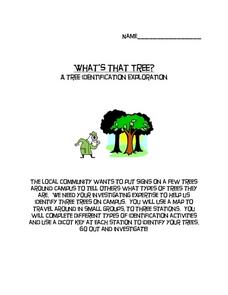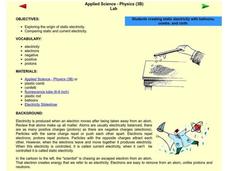National Nanotechnology Infrastructure Network
Synthesis and Characterization of CdSe Quantum Dots
Does the size of a sample change the physical properties of that substance? It turns out it can! Young scientists combine physics and chemistry to synthesize CdSe quantum dots and record their color properties. Learners should...
NASA
Cosmic Microwave Background
Begin your next class with a BANG! Pupils discuss the formation of our universe and its expansion before proceeding with an activity designed to demonstrate what most likely occurred billions of years ago. They conclude with a discussion...
University of Colorado
Is There Life on Earth?
To find life on another planet, scientists look for gases (atmosphere), water, and temperatures that are not extreme. For this activity, groups of pupils become "Titan-ians," scientists who want to explore Earth for possible life forms....
NOAA
Plankton
Dive into the world of plankton. The 17th installment of a 23-part NOAA Enrichment in Marine sciences and Oceanography (NEMO) program introduces different types of plankton. Young scientists then use what they have learned to classify...
Rivanna Regional Stormwater Education Partnership
Invisible Passengers
How does water pollution affect the organisms living in the water? Use three science experiments to examine how erosion and other pollutants can affect water quality. Each experiment focuses on a different aspect of pollution and...
Bowels Physics
Newton's Second Law
Were it not for Sir Newton, our understanding of physics and matters of the world would be drastically different. Present your class with detailed information of Newton's Second Law as they explore the concepts of mass and acceleration....
Curated OER
Zoo-Goers Ready to Greet Baby Panda
The Smithsonian's National Zoo, also known as the Washington Zoo, is one of the oldest zoos in the United States. Youngsters read and discuss a news article about Tai Shan, baby panda that was one of the zoos most famous residents. They...
NOAA
A Matter of Density
Larvae transportation on the New England seamounts is based on the density of the water. Scholars calculate density and graph salinity versus temperature to better understand the distribution of organisms in a water column....
Curated OER
Universal Gravity and Kelper's Laws Worksheet
High school physicists apply their knowledge of planetary motion. Using Kepler's three laws, Newton's law of universal gravitation, and the provided properties of the moon, sun, and Earth, they proceed to solve 23 problems. An...
National Nanotechnology Infrastructure Network
Mixtures and Nanotechnology
What does size have to do with it? Learners analyze different mixtures, both homogeneous and heterogeneous, to discover the properties related to the size of their particles. The activity connects these properties to those of...
Savvas Learning
Let's Get Moving
Scholars examine, cut, paste, and sort 12 images featuring different types of movement in order to show what they know about energy—potential and kinetic.
Curated OER
Observation and Inference
Assess your young scientists' understanding of the difference between observation and inference with this 20-question multiple choice quiz. It reviews a variety of physics and astronomy concepts, such as solar eclipses and sunspots, the...
Mr. E. Science
An Introduction to Matter
What's the matter? Gas, solid, liquid, or plasma. The presentation covers how to describe and identify matter, changes in matter, types of matter, measuring matter, particles of matter, Democritus, and John Dalton's Atomic Theory.
Curated OER
Heat and Conduction
This simple activity is ideal for upper elementary learners when studying physical science. Using their sense of touch to describe how hot something feels, and then comparing their observations to thermometer measurements, they discover...
Carnegie Mellon University
How Power Plants Work 3
Double, double toil and trouble, fire burn and cauldron bubble! Find out what drives a turbine to generate electricity and whether or not it has an impact on the environment. A discussion and lecture is divided by a hands-on activity in...
Curated OER
What Is Important to Me?
Students respond to prompt with awareness of personal value of possessions. They list the criteria used to determine worth and value. They listen and ask questions or add comments and check their own measures of value with those the...
Curated OER
Telecommunication: Sound Waves
Some interesting diagrams here will pique your students' interest as they discover what is actually inside the telephone that they use every day! The frequency and amplitude labels then lead to further details about sound and waves of...
Curated OER
Applied Science - Physics Pre-Lab
Students describe the science of physics. In this Physics lesson, students observe examples of physics within their classroom. Students create a definition for physics.
Curated OER
What's That Tree?
Fifth graders identify trees along a nature trail. Using a dichotomous key, 5th graders answer questions to aid in their identification of trees along a specified nature trail. Observations are recorded in their science journals. Sample...
Curated OER
Physics of a Slingstone: Slingstones in flight
Students gain a better understanding of the technology used by ancient Chamorros. In this physics lesson students theorize ways to forcefully throw a fist-sized object and discuss the technology behind a slingstone.
Curated OER
Applied Science - Physics Pre-Lab
Students view a static electricity demonstration. In this Physics lesson, students compare static and current electricity. Students watch an electricity slide show and sing the Electricity song.
Curated OER
Applied Science - Physics Lab
Students explore electricity. In this Physics lesson, students investigate the origin of static electricity. Students compare static electricity to current electricity.
Curated OER
Applied Science - Physics Pre-Lab
Students observe fluid motion. In this Physics lesson, students explore the principles of Pascal, Archimedes, and Bernoulli. Students list their experiences with fluid movement.
Curated OER
What happens to water before we use it?
Students examine how water is treated prior to becoming available for human consumption. In this water treatment instructional activity, students conduct an experiment in which they filter water. Students formulate a hypothesis, test,...









